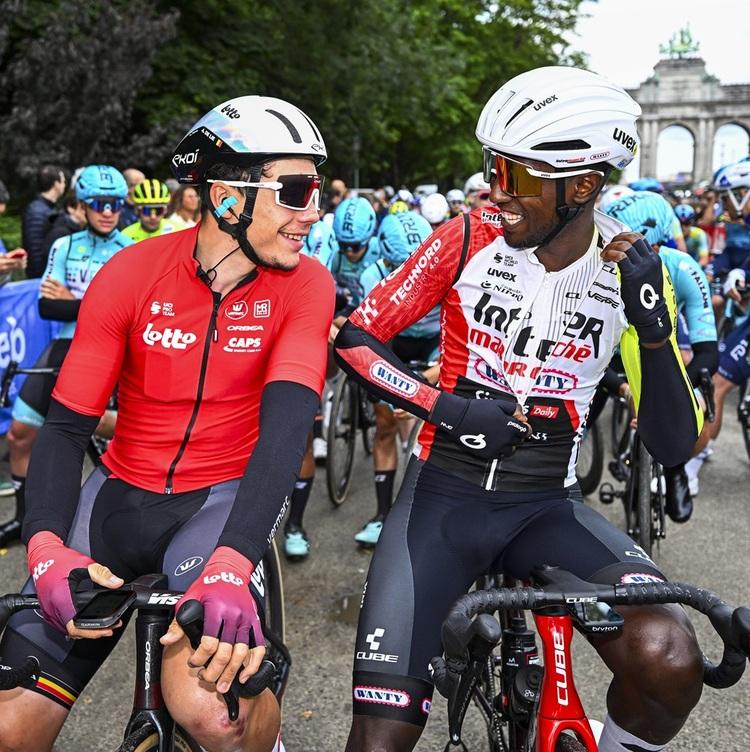In a striking development that has raised eyebrows and ignited discussions within the retail and sporting communities alike, reports have surfaced indicating that the IntermarchĂ©-Lotto cycling team is grappling with a staggering €2.5 million debt. This financial turmoil has prompted renewed scrutiny over the recent fusion of the IntermarchĂ© and Lotto brands, collective concerns about the sustainability and future viability of the partnership. Adding to the intrigue, the team is reportedly putting its bus up for sale, further underscoring the precarious financial position they find themselves in. As stakeholders seek clarity on the implications of this debt for both the team’s performance and the broader synergy from the merger, the unfolding situation reveals critical questions about sponsorship, management, and the intersection of sport and commerce.
Reported Debt Raises Concerns Over Intermarché-Lotto Fusion and Operational Viability
Recent reports unveiling a €2.5 million debt have ignited intense discussions surrounding the viability of the IntermarchĂ©-Lotto fusion. Stakeholders are expressing concerns about how this financial burden might impact future operations and strategic decisions. Observers worry that the debt could hinder the newly formed alliance’s ability to invest in necessary infrastructure and initiatives aimed at improving customer experience. Experts have raised questions about whether this debt will necessitate cutbacks or reallocation of resources, potentially stunting growth and innovation in an already competitive market.
Moreover, the implications of this debt extend beyond financial standings, as rumors circulate about the potential sale of a team bus formerly used for promotional events. This move raises eyebrows among fans and investors alike, prompting speculation on the financial health of the organization. As stakeholders await further clarification from Intermarché and Lotto regarding their long-term plans, it is evident that these fiscal challenges will need to be addressed promptly to restore confidence in the new partnership.
Team Bus Sale Adds Layers to Financial Scrutiny Amidst Ongoing Challenges
The recent decision to put the team bus up for sale has increased scrutiny surrounding the financial health of the Intermarché-Lotto cycling team, especially as they grapple with a reported €2.5 million debt. Stakeholders are raising eyebrows over the implications of this sale, questioning whether it reflects deeper financial woes or a strategic maneuver to alleviate some of the current fiscal strain. Key figures within the organization have yet to clarify the rationale behind this decision, leaving fans and analysts alike to speculate on the potential impact on team logistics and performance ahead of critical races.
Analysis suggests that the team may be facing challenges not limited to immediate financial obligations. Observers point to several factors contributing to this pressing situation:
- Increasing operational costs amid a competitive cycling landscape.
- Declining sponsorship revenues as other teams attract bigger investments.
- Uncertain economic conditions affecting fan engagement and merchandise sales.
The team’s leadership could consider restructuring strategies, including potential partnerships or sponsorships that go beyond traditional cycling, to stabilize their financial future. With the team’s next steps under scrutiny, the sale of the bus may serve as a pivotal moment in reshaping their operational outlook.
Expert Insights Suggest Strategic Management Changes to Navigate Debt Crisis
Recent expert analyses indicate that the ongoing debt situation surrounding the Intermarché-Lotto partnership could necessitate strategic management changes to mitigate further financial distress. Observers highlight several critical areas for evaluation, particularly emphasizing the need to reassess operational efficiencies and revenue streams. To facilitate a smoother navigation through this troubling phase, industry insiders recommend focusing on:
- Cost Optimization: Streamlining operational costs to ensure sustainability.
- Diverse Revenue Channels: Exploring alternative sources of income to reduce dependency on fixed assets.
- Transparent Communication: Engaging openly with stakeholders to maintain trust and foster collaborative solutions.
In addition, the sale of the team bus has emerged as a symbol of this financial pivot, raising questions about future investments and partnerships. As the management contemplates strategic divestments, an approach focused on prioritizing short-term liquidity over long-term growth may be essential. A recent financial snapshot outlines the pressing concerns, illustrating the need for a robust plan:
| Financial Indicator | Current Status | Recommended Action |
|---|---|---|
| Total Debt | €2.5 million | Restructuring Strategies |
| Cash Reserves | €500,000 | Immediate Cutbacks |
| Projected Revenue | €1 million/quarter | Diversification |
To Conclude
As the €2.5 million debt casts a shadow over the recent IntermarchĂ©-Lotto fusion, the implications of this financial strain are reaching far beyond the balance sheets. The ongoing discussions surrounding the future of the team and its ambitions in the competitive cycling landscape remain uncertain. Additionally, the unexpected decision to put a team bus up for sale raises further eyebrows, prompting speculation about the club’s operational stability and long-term strategy. Stakeholders, fans, and industry insiders alike will be closely monitoring how this situation unfolds as the team navigates these challenges. Transparency and strategic decision-making will be crucial in restoring confidence and ensuring the future success of this ambitious collaboration. As the story develops, one thing remains clear: the world of professional cycling never ceases to stir intrigue and raise questions.











